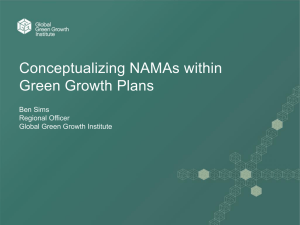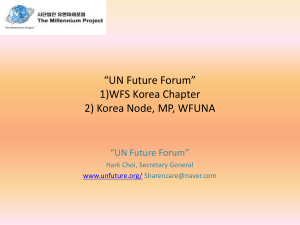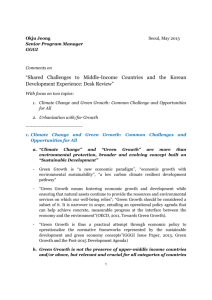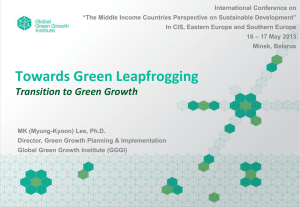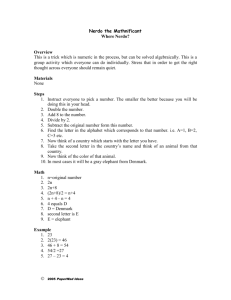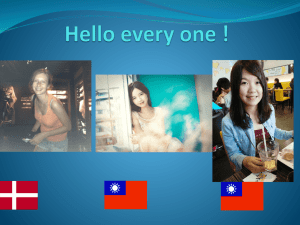Concept note for the Organisation Strategy for Denmark's
advertisement
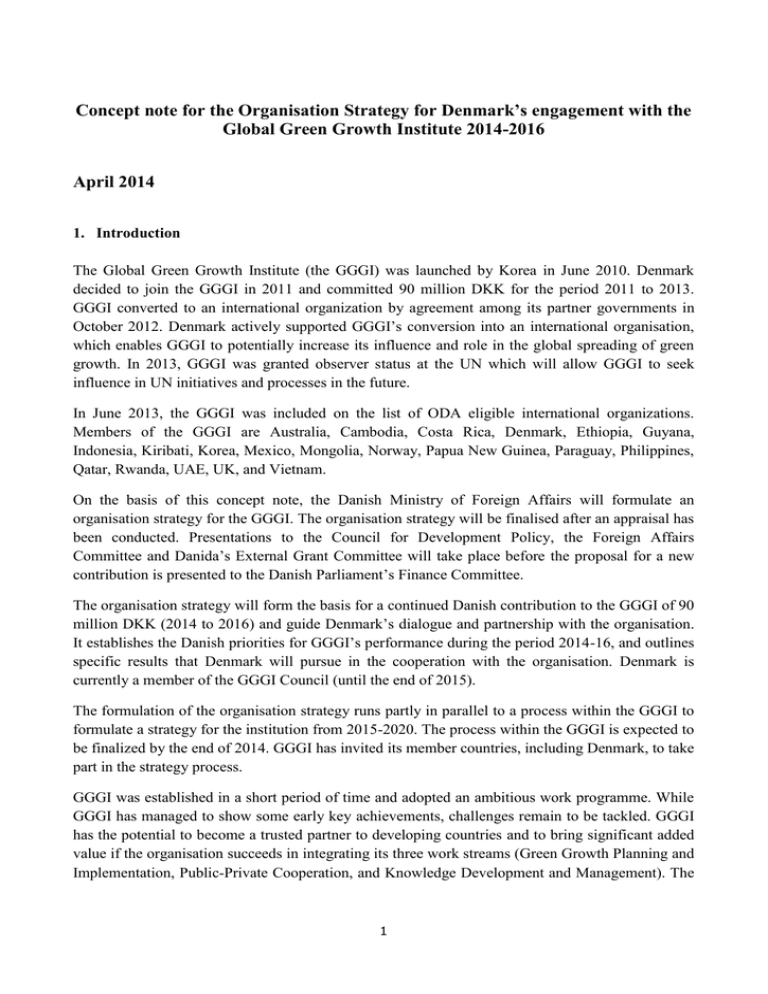
Concept note for the Organisation Strategy for Denmark’s engagement with the Global Green Growth Institute 2014-2016 April 2014 1. Introduction The Global Green Growth Institute (the GGGI) was launched by Korea in June 2010. Denmark decided to join the GGGI in 2011 and committed 90 million DKK for the period 2011 to 2013. GGGI converted to an international organization by agreement among its partner governments in October 2012. Denmark actively supported GGGI’s conversion into an international organisation, which enables GGGI to potentially increase its influence and role in the global spreading of green growth. In 2013, GGGI was granted observer status at the UN which will allow GGGI to seek influence in UN initiatives and processes in the future. In June 2013, the GGGI was included on the list of ODA eligible international organizations. Members of the GGGI are Australia, Cambodia, Costa Rica, Denmark, Ethiopia, Guyana, Indonesia, Kiribati, Korea, Mexico, Mongolia, Norway, Papua New Guinea, Paraguay, Philippines, Qatar, Rwanda, UAE, UK, and Vietnam. On the basis of this concept note, the Danish Ministry of Foreign Affairs will formulate an organisation strategy for the GGGI. The organisation strategy will be finalised after an appraisal has been conducted. Presentations to the Council for Development Policy, the Foreign Affairs Committee and Danida’s External Grant Committee will take place before the proposal for a new contribution is presented to the Danish Parliament’s Finance Committee. The organisation strategy will form the basis for a continued Danish contribution to the GGGI of 90 million DKK (2014 to 2016) and guide Denmark’s dialogue and partnership with the organisation. It establishes the Danish priorities for GGGI’s performance during the period 2014-16, and outlines specific results that Denmark will pursue in the cooperation with the organisation. Denmark is currently a member of the GGGI Council (until the end of 2015). The formulation of the organisation strategy runs partly in parallel to a process within the GGGI to formulate a strategy for the institution from 2015-2020. The process within the GGGI is expected to be finalized by the end of 2014. GGGI has invited its member countries, including Denmark, to take part in the strategy process. GGGI was established in a short period of time and adopted an ambitious work programme. While GGGI has managed to show some early key achievements, challenges remain to be tackled. GGGI has the potential to become a trusted partner to developing countries and to bring significant added value if the organisation succeeds in integrating its three work streams (Green Growth Planning and Implementation, Public-Private Cooperation, and Knowledge Development and Management). The 1 development of the new Strategic Plan will be essential in this regard. Denmark wishes to play an active role in this process based on a continued contribution for 2014-16 and based on active engagement in the GGGI Council. 2. Relevance and justification of the future Danish support to GGGI Denmark is supporting GGGI because of its potential to: - make a difference in addressing three major barriers hampering green growth initiatives: 1. Lack of practical experience in planning and implementing green growth strategies; 2. Gaps in theoretical and empirical evidence for green growth; 3. Barriers preventing the engagement of the private sector in facilitating the deployment of resource-efficient technologies; - become a trusted partner to governments, advising governments on national or regional green growth policies and facilitating implementation; - become an innovative organisation with high legitimacy among developing countries partly because of its governance structure and its base in South Korea; Economic growth is the principal enabler of long-term poverty reduction. At the same time, economic growth creates immense pressure on global resources. There is no doubt that the existing global growth strategy is operating beyond the ecological boundaries of the planet in a situation where we are expected to be 9 billion people on the planet by 2050 and where the success in poverty reduction results in a significantly and constantly increasing global middle class which challenges the sustainability of the present growth path. The consequences of not limiting global warming will have devastating effects on ecosystems, and give rise to a combination of serious dangers for people all over the world – but most seriously in developing countries – in the form of spreading of diseases, unpredictability of precipitation for cropping patterns, and destruction of infrastructure due to flooding, stronger storms and other extreme weather incidents like heavy precipitation and draughts. Ensuring a more green growth development path globally is therefore vital for the viability of economic development and poverty reduction in the longer term, not least in developing countries. It is in this context that Denmark’s development cooperation strategy, ‘The Right to a Better Life’ adopted by the Danish Parliament in May 2012, includes green growth as one of four priorities for Denmark’s global development policy engagement. The instruments for this are further outlined in the ‘Strategic Framework for Natural Resources, Energy and Climate’ (NEC Strategy, 2013) and the ‘Strategic Framework for Growth and Employment’ (GE Strategy, 2011). The implementation of the NEC strategic framework builds upon collaboration and partnership, matching the development challenges and the location-specific contexts at hand. The strategy states that Denmark will cooperate with partners who most effectively advance the objectives of the NEC Strategy. GGGI’s vision is that the world makes a paradigm shift to “green growth”, a model of economic growth that simultaneously achieves poverty reduction, job creation, social inclusion as well as environmental sustainability and resource security. GGGI’s mission is to advance the practice and 2 theory of green growth by helping to develop, implement and deepen understanding of green growth strategies. GGGI’s vision and mission correspond well with Denmark’s strategic green growth priority. While many developing countries are increasingly aware that green growth is an attractive development path, many are not well equipped to assess the opportunities, costs and risks – both in terms of the analytical tools and in terms of institutional set-ups. GGGI is not a green growth advocacy organisation, but a specialised agency entirely dedicated to working with policy makers of countries to identify win-win, pro-development/pro-environment green growth related policy choices and to help them expand the frontier of policy options by also helping them mobilise the necessary finance, technology and institutional capacity. While technical expertise offered by many organisations goes hand in hand with the potential for large grants or loans, GGGI only offers technical expertise. This enables GGGI to work with governments as a neutral and credible partner, promoting the commitment of partner governments to a shift in development towards green growth and to facilitate cooperation with the private sector and civil society. GGGI is therefore regarded by developing countries as a legitimate player. This is strengthened by the fact that participating countries and contributing countries sit together in the Council and because the headquarter office is situated in Korea which has a special image having recently been among the poorest countries and now being one of the strongest economies in the world. At best, GGGI will be able to give an important contribution to the international community’s ability to integrate the economic, social and environmental work streams of sustainable development in a way that is acceptable to developing countries, thereby improving other diplomatic and economic efforts and possibilities of UN processes. According to the Danish led donor review of GGGI (September 2013), GGGI has the potential to become a trusted advisor to partner countries – with a focus on analysis and planning to achieve the government’s national development objectives accompanied by a readiness to engage in a constructive dialogue with stakeholders, including civil society organisations and the private sector. This is in line with “The Right to a better life”, stating that green growth can only be achieved if there is an open and inclusive dialogue between citizens, civil society, the business community and national authorities. And if GGGI succeeds in this, it will be an important achievement that supplements other Danish efforts both within the Climate Envelope, 3GF as well as other bilateral and multilateral contributions that can be defined as relevant to adaptation and mitigation efforts. E.g. in Indonesia, there are possibilities for synergy and cooperation between GGGI and Denmark, particularly when it comes to greening the Masterplan for Acceleration and Expansion of Indonesia's Economic Development. In Ethiopia, Denmark is preparing a new bilateral green growth programme which will in a first phase of 3 years promote climate smart agriculture. Danish support will facilitate a stronger focus on sustainability and climate resilience in transforming the agricultural sector, through e.g. innovative techniques and the strengthening of value chains, and support initiatives to reduce the sector’s contribution to climate change. It would be sensible to 3 build on GGGI’s current work with the Ethiopian government on the Climate Resilient Green Economy Initiative. Under the Climate Envelope, Denmark is supporting bilateral and multilateral initiatives covering a wide spectrum of green activities supplementing each other, such as the Least Developed Countries Fund (LDCF), The UN Climate and Technology Center and Network, and the The Climate Investment Funds (CIF). When the Green Climate Fund (GCF) becomes operational, Danish support to GGGI and to the GCF will complement each other as GGGI gives policy guidance to governments and facilitates implementation of strategies, whereas the GCF assists on financing. The fact that both the GCF and GGGI have headquarters in South Korea can possibly facilitate further cooperation between the two institutions. GGGI’s current strategic plan The GGGI’s current strategic plan operates with the following three main objectives: Adoption and implementation of green growth plans (with adequate local stakeholder support, financing and technologies); Provision of relevant, high-quality research for policymakers; and Engagement of the private sector in implementation of country green growth plans and global sectorial initiatives. Upon conversion into an international organisation, GGGI adopted a new governance structure consisting of an Assembly, Council and a Secretariat with headquarters in Seoul and offices in Abu Dhabi, Copenhagen and London. The organisational chart is found in annex 1. In 2014, the Council will study the office structure. From a Danish perspective it would make sense to gather the European activities in one office. The UN city in Copenhagen offers an ideal venue, hosting already the The Climate Technology Centre and Networks (CTCN), the SE4ALL Energy Efficiency Hub (EE Hub), and the UNEP Risoe Centre (URC). GGGI fits very well into this center of excellence, and GGGI could add substantial value to – and benefit from – the expertise and knowledge being built here. Also, a European GGGI office in Copenhagen could enhance close cooperation with the 3GF-iniative. GGGI is working in Brazil, Cambodia, China, Colombia, Ethiopia, India, Indonesia, Jordan, Kazakhstan, Mongolia, Peru, Philippines, Thailand, Mekong, Mexico, Rwanda, South Africa and Vietnam. GGGI’s approach to country selection is under development, based on the three criteria: 1) Alignment with GGGI mission, 2) Potential for successful delivery and 3) Fit with GGGI’s internal capacity and value-added. The GGGI only works in countries where there is a high-level commitment to the green growth economic transformation or where there is strong potential, after an initial round of work, for this to 4 develop. Before entering into a country engagement, the GGGI requires the government to identify a domestic institutional partner in which the GGGI can infuse analytical and, as necessary, management capacity while conducting analysis and supporting the government’s inter-ministerial and stakeholder consultation process. Denmark is one of the core funders to GGGI – and Denmark has valuable experience and competence in the area of sustainable development and transition to a green economy. Denmark is therefore a key donor for the GGGI – not only in financial terms – but also as an active member of its governing bodies. Therefore, Denmark has a larger than usual possibility to influence the work and the ongoing strategic planning of the organisation. 3. Lessons learned As mentioned, GGGI was established in a short period of time on the basis of great ambition. Expansion of activities began before GGGI had finalised it strategic thinking on how to make a difference and reach the ambitious goals that were set. Also, internal support functions, including internal administrative regulations and the necessary financial control and support functions were lagging behind. In 2012 a report by the Korean National Audit Authority identified a large number of irregularities, weak administrative rules, and insufficient implementation of the rules. On that basis, the GGGI management undertook focussed efforts to follow up on all the areas that were identified in the Korean report. In 2013, Norway commissioned three reports to be made by Deloitte to follow up on the implementation of administrative rules and procedures in the head quarter in Seoul and in the country operations in Indonesia and Ethiopia. The conclusions of the reports are that the GGGI has ensured a sufficient and satisfactory follow-up in the headquarter functions in Seoul. However, challenges persist in ensuring the implementation of necessary financial control and support rules at the country level. This was especially the case in Ethiopia while the situation was better in Indonesia without being fully satisfactory. The management response to the Deloitte reports shows that the GGGI management have addressed or are in the process of addressing the identified weaknesses. Denmark puts high emphasis on the conclusions and recommendations in the Deloitte reports, and Denmark will in the Council work to ensure that the country presences get the necessary support from the head quarter to implement the adopted administrative and financial rules and procedures and to monitor and report on achieved results. In 2013, Denmark led a joint donor review of GGGI. The review team concluded that planning and implementation activities in the two visited countries are moving ahead with some key early achievements. In general, less progress has been made on research and PPC. One main challenge is that the three work streams of GGGI (Green Growth Planning and Implementation, Public-Private Cooperation, and Knowledge Development and Management) have not been integrated in the 5 country projects. According to the review, GGGI staff at country level are highly competent within each their areas of specialisation and dedicated to the vision of green growth. However, staff has felt detached from headquarters and there has been a lack of communication, strategic guidance, professional and administrative support. According to the review-team, GGGI should: Establish a long term financing model Limit expansion into new countries Focus on professionalization Ensure integration of the three workstreams Ensure that the GGGI identity and strategy is fully understood and owned by all staff Ensure that all staff have competence in change management, political economy, environmental management and development cooperation Ensure that country programs have a clear strategic focus with strong local participation and a two way sharing of knowledge in countries and between partner countries. GGGI management has been very pleased with the joint donor review and has actively been following up on the conclusions and recommendations. The conclusions and recommendations of the joint donor review will continue to guide Denmark’s engagement with other partners and GGGI in the work with the new Strategic Plan 2015-20. GGGI is currently in the process of implementing a new monitoring system which will facilitate information flows, timeliness and reporting. GGGI is currently working on its annual report 2013, and the information on results created so far will therefore be updated in the final organisation strategy. The following is based on GGGI’s results report from October 2013: Green Growth Planning and Implementation: Outcome target: “Green growth strategic and implementation plans are developed, adopted and implemented by governments and other stakeholders, supported by GGGI with rigorous analysis, financial, institutional and technical expertise”. Activities are on track to meet two of the four projected outcome targets while activities to meet two indicators are delayed. Of the eight output indicators, activities are on track to meet four of the projected targets, while two are delayed and two are far from realisation and therefore require revision. Knowledge Development and Management: Outcome target: “Relevant, high quality research is made available by the GGGI and is used to explore green growth and guide policymakers and others, in particular GGGI Partner Countries”. All three outcome indicators and all four output indicators are on track to meet projected 2014 targets. Public-Private Cooperation: Outcome target: “The private sector is directly engaged in green growth plans and initiatives”. Activities are delayed to meet the 2014 target that 80 pct. of green growth plans have been subject to private sector consultation. Activities are on track to meet the four projected 2014 output targets. 6 4. Intended Danish priority areas In the development and implementation of the future Strategic Plan, Denmark will focus attention on promoting an inclusive approach and improving GGGI’s effectiveness: 1) Activities should be consolidated with a focus on creating measurable results in a realistic number of partner countries, taking into consideration resources and capacity at hand. 2) The 3 work streams (1) Green Growth Planning and Implementation, 2) Public-Private Cooperation and 3) Research / Knowledge Development and Management) should be better integrated in order for GGGI to fulfil its potential as described in section 3. It is crucial to ensure buy in from the private sector and the public in order for national green growth strategies to be as effective as possible. Therefore, strategies should be developed in consultation with the private sector and all other relevant stakeholders. Furthermore, Knowledge Development and Management activities must be demand driven and focussed especially on supporting the two other work streams, e.g. analyse incentive structures for the private sector and how these differ in different countries and contexts. 3) An open and inclusive dialogue between citizens, civil society, the business community and national authorities is necessary to ensure broad ownership for national and regional green growth strategies. Instruments for measuring social inclusion, citizens’ involvement and awareness raising should be developed. 4) Poverty reduction should be a core success criterion for GGGI’s work on green growth planning and implementation. Where poverty reduction is not in focus, a human rights-based approach should ensure that poor and marginalised groups are not excluded from the benefits or unintentionally harmed by new green policies, regulations and investments. Appropriate social and environmental screening processes should be put in place to ensure inclusion and to mitigate adverse and discriminatory impacts on poor or marginalised groups. GGGI is currently taking the CSR and sustainability and safeguards agenda forward. Denmark will support GGGI’s effort and work for the new sustainability management framework to be based on UN Global Compact and UN Guiding Principles on Business and Human Rights. 5) Building on GGGI’s new status as a UN observer and the organisation’s legitimacy among developing countries, GGGI should seek influence at the global level, including UN initiatives and processes, as mentioned in section 3. 6) Professionalisation of the organisation is a prerequisite for GGGI to fulfil its potential. Financial and administrative policies, rules and procedures, that match international standards, including anti-corruption measures, must be implemented at all levels of the organisation. 7 7) In order for GGGI to improve its effectiveness and succeed in the above mentioned areas, a focused and realistic strategic plan with a concrete results framework, including measurable targets and indicators must be developed. The plans for this results framework is elaborated in section 6. 5. Preliminary budget In 2011, Denmark decided to support the GGGI with 90 million DKK for the period 2011-2013. A new contribution of 90 million DKK for the period 2014-16 will ensure Denmark a seat in the GGGI Council which is essential for our possibilities to gain knowledge about and influence the development of the institution and achieve results. The Danish contribution will be financed from the Climate Envelope, partly from the Global-Frame and partly from the Poverty-Frame. Denmark’s contribution to the GGGI 2014-2016 Year 2014 Amount (mill DKK) 30 2015 30 2016 30 The total GGGI budget for 2014 is approximately 55 million USD. Projects equivalent to 9.5 million USD have been postponed until the necessary financing is ensured. Currently, two thirds of the resources are being used for support for developing and implementing green growth plans while one third is spent on the other two work streams – something that Denmark has been actively supporting and will continue to support. Focus should be on creating measurable results. The budget is partly financed by core contributions and partly by earmarked funding. The 2014 budget is based on the assumption of at least four core funders. The GGGI will actively work to attract more members in the coming years, and the budget is expected to grow due to this process. Before the annual payments (30 million DKK), Denmark will require an external audit with satisfactory conclusions and an annual report documenting results. In addition, Denmark has requested that GGGI commissions a Value for Money audit of 2013 to be conducted in 2014. The need for a Value for Money audit of 2014 in 2015 will be looked into. As a follow-up to the joint donor review and the Deloitte reports, Denmark will require that GGGI in 2014 and the coming years enhances the capacity building within the GGGI presence in partner countries, e.g. through an advisor or staff with competences within financial control and good administration practice and through training. Together with other donors, Denmark will work to find a model for GGGI to document how financial and administrative systems at country level have been strengthened. 8 6. Reporting and monitoring The 2014-16 draft Work Plan and Budget includes Key Performance Indicators, milestones and targets for all GGGI work streams. A new Global Resource Efficiency Management System is scheduled for implementation during 2014. The new system has potential to greatly facilitate information flows, timeliness, reporting and reduce both transaction costs and the reporting burden. It will provide a single source for information. For example, project work plans and contract award and disbursement projections that are developed and approved as part of the budget process will be used directly for monitoring and reporting purposes – allowing real-time monitoring. Project achievements in producing outputs and reaching milestones – which the GGGI monitors as part of effective project management – will be updated in the system as they occur and allow the responsible unit in the secretariat to generate reports without having to revert back to the teams requesting duplicative reports. As part of the new strategic plan, a new results framework will be developed. Currently, GGGI is working to develop a new results framework that will establish a clear link between three different levels of results, across each of the GGGI programmatic work-streams: Level 1: Global Goals which express GGGI’s six year development impact, in countries, regions and globally. The global goals, reflecting GGGI’s vision, mission, Overseas Development Assistance (ODA) status and Governing Council decisions, are results that GGGI will contribute to (i.e. same level as “impact”). GGGI is one of many organizations that assist national governments in their progression towards achieving these objectives. Achievements at this level cannot be attributed to any given development partner, but are the result of interventions of an array of stakeholders. GGGI will contribute to achieving progress in line with its mandate, but at this highest level of results, there can be no direct attribution of causality. Level 2: Organisational Outcomes: The Organisational Outcomes reflect both the Strategic Outcomes and the Functional Outcomes. Strategic Outcomes represent GGGI’s development outcomes contributing to the achievement of the Global Goals. They are proposed to be a carefully selected manageable set of results defined for each of the three core work-streams of GGGI with a validity of three years (aligned with the duration of the work programme and budget). The Strategic Outcomes should be linked to the Global Goals and have measurable indicators of achievement, milestones and targets. One Functional Objective focusing on management and administration, mainstreamed into all the Strategic Outcomes, is proposed to be formulated with a focus on efficiency, effectiveness and cost savings. Level 3: Organisational outputs: The Organisational Outputs are the direct contribution of GGGI in terms of processes, products and services to the Strategic and Functional Outcomes. They are the basis of project formulation and represent the results attributable to GGGI at the global, regional and national levels and the tangible delivery of GGGIs interventions. The elaboration of the Organisational Outputs will be the basis for work programme and budget preparation and implementation. 9 Once the Strategic Plan is developed and approved, it is proposed that all GGGI intervention countries develop a brief Country Engagement Strategy in order to ensure coherence between country priorities and overall priorities. Denmark supports the development of a new results framework as part of the new strategic plan. Denmark will work for the inclusion of the results framework in the assessment to be carried out by a joint donor review in 2015. 7. Major risks and assumptions Risk no. 1: Financial stress GGGI is under financial stress and faces cash-flow problems when pledged donor contributions are not paid on time as expected. As a small organisation with few core donors, GGGI is particularly vulnerable to shrinking donor contributions which will threaten GGGI’s efforts to make a difference, fulfil its ambitions and deliver on its obligations, including delivering tangible results. Given the continued strained public budgets in almost all traditional donor countries it will require a strong and focussed engagement to ensure more donors. GGGI is working on establishing a sustainable financial model which brings more predictability and stability in its operations. A comprehensive Resource Mobilisation Strategy 2015-20 will be developed as an integrated part of GGGI’s Strategic Plan. In the short term, a hand on resource mobilisation action plan will be developed focusing on immediate action vis-à-vis core funding, earmarked funding and private foundation. Risk no. 2: Lack of implementation of administrative and financial rules and procedures According to the Deloitte revision, administrative and financial rules and procedures of international standard have been put in place in the headquarter office. It is furthermore the clear impression of the Ministry of Foreign Affairs that the management of the GGGI has its attention on the implementation of these rules and procedures, including the necessary internal support and control functions. However, GGGI cooperates with geographically and economically diverse developing countries and it cannot be ruled out that there will be delays in the implementation of rules and procedures in one or more of the country operations. Together with other donors, Denmark will work to find a model where GGGI can document financial and administrative progress at country level without spending all resources on reporting. Risk no. 3: Lack of a common organisation culture As mentioned in the joint donor review, the current Strategic Plan was developed with limited participation of GGGI staff, and thus little ownership and impact. It is expected that the development process of the new plan will be inclusive at all levels. Still, there is a risk that the future Strategic Plan – and with that the GGGI identity – will not be owned and consistently interpreted in the same way by all staff, management and governing bodies. Insufficient attention to the development of a common organisation culture will be a threat to GGGI’s success as an 10 important international player. In the strategy process Denmark will therefore work for an inclusive process. Annex 1: Organisational chart of the GGGI 11
